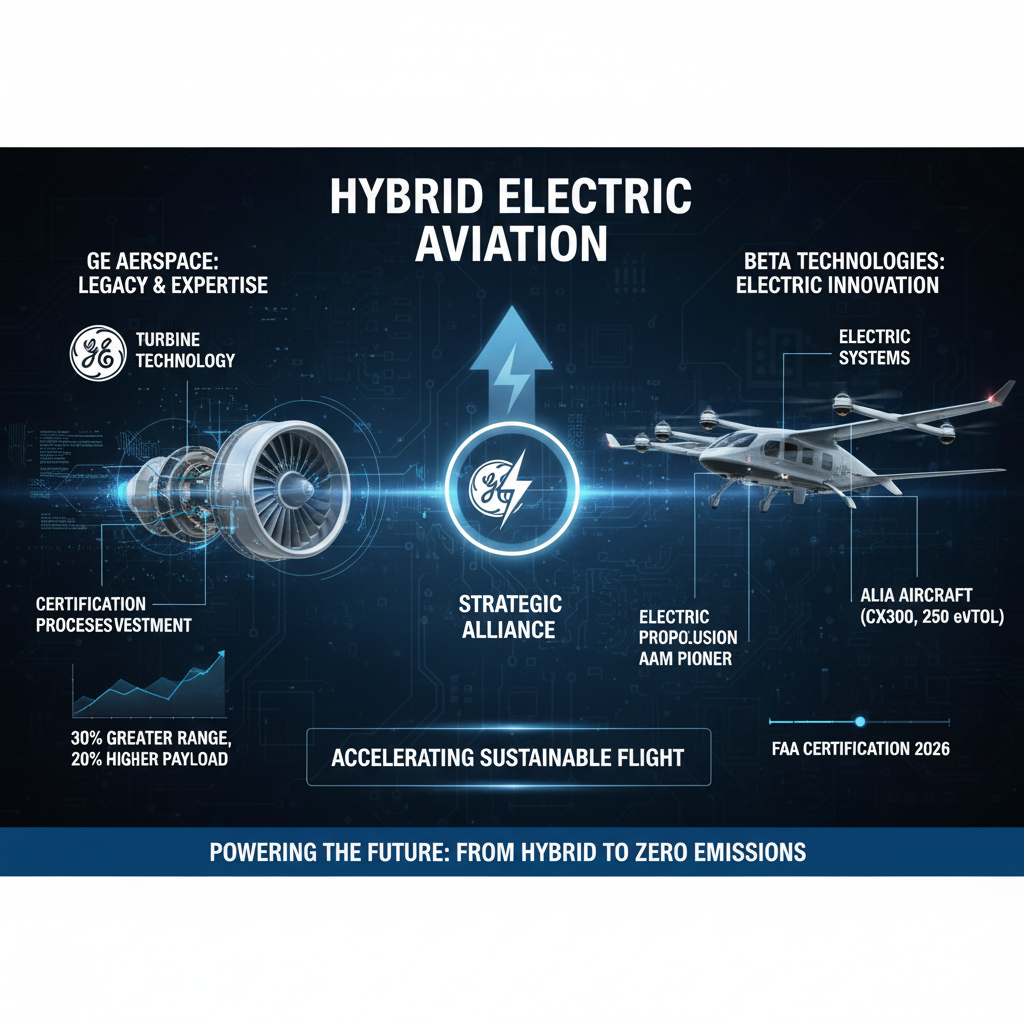
Introduction: A Strategic Alliance for the Future of Flight
GE Aerospace and BETA Technologies have announced a landmark partnership to accelerate the commercialization of hybrid electric aviation. This collaboration merges GE’s deep expertise in turbine technology and certification processes with BETA’s pioneering electric propulsion systems.
The goal is clear: to overcome the limitations of battery-only aircraft and meet the global demand for sustainable, high-performance aviation. The partnership marks a major step in advancing Advanced Air Mobility (AAM), positioning both companies as key players in the evolution of hybrid-electric aircraft.
1. Strategic Investment and Industry Impact
GE Aerospace has made a $300 million equity investment in BETA Technologies, securing a seat on BETA’s board and solidifying a long-term strategic partnership.
This substantial financial commitment supports BETA’s ongoing work in electric generators and flight testing, while leveraging GE’s proven leadership in turbine systems and regulatory certification.
At the core of the collaboration is the development of a hybrid electric turbogenerator based on GE’s CT7 and T700 engines. This new system is expected to deliver:
- Up to 30% greater range
- 20% higher payload capacity
- 15% faster speeds than current eVTOL platforms
By combining turbine reliability with electric propulsion, the GE-BETA alliance directly addresses a key challenge in Advanced Air Mobility: scalability. Their approach aims to create aircraft that are both efficient and compatible with existing airport infrastructure.
Industry analysts view GE’s move as a strategic entry point into hybrid-electric technology, predicting that this collaboration will reshape competitive dynamics in the aviation industry. Competitors may now be compelled to accelerate their own hybrid programs to remain viable in a rapidly advancing market.
2. Regulatory Progress and Certification Milestones
Regulatory approval has long been a hurdle for electric aviation, but recent developments signal a shift toward supportive policy frameworks.
In December 2024, the Federal Aviation Administration (FAA) issued final Special Conditions for BETA’s pusher electric engine, marking a key certification step. This move demonstrates the FAA’s new performance-based regulatory approach, allowing manufacturers to propose customized compliance methods while maintaining safety standards.
Further momentum came from Hartzell Propellers, which achieved certification for a five-bladed electric propeller tailored for BETA’s Alia CX300 and Alia 250 eVTOL aircraft.
GE Aerospace also has its own milestones, including the 2022 megawatt-class hybrid system test at 45,000 feet, proving that turbine-electric integration is viable under commercial flight conditions.
With these achievements, GE and BETA are on track to:
- Achieve FAA certification for the hybrid turbogenerator by 2026
- Meet BETA’s certification targets for the Alia CX300 in 2025 and the Alia 250 eVTOL in 2026
3. Competitive Advantages in a Rapidly Expanding Market
While competitors such as Joby Aviation and Archer Aviation are focusing on pure-electric eVTOL designs, the GE-BETA hybrid system offers a more practical and scalable solution.
Joby’s all-electric air taxi, expected by 2030, is limited to a range below 150 miles per charge. In contrast, the GE-BETA hybrid system extends operational range beyond 300 miles, making it ideal for regional passenger and cargo operations.
The global electric aircraft market is projected to grow at a 20% compound annual rate, reaching $71 billion by 2034. Within that expansion, hybrid systems that balance energy density with infrastructure readiness will be central to sustainable aviation growth.
This collaboration positions GE Aerospace and BETA Technologies as leaders in hybrid-electric flight, setting performance benchmarks for a new generation of efficient and eco-conscious aircraft.
4. The Broader Vision: Hybrid Today, Fully Electric Tomorrow
The partnership between GE Aerospace and BETA Technologies is more than a financial alliance. It represents a technological bridge between current propulsion systems and a fully electric future.
By combining GE’s decades of turbine experience with BETA’s cutting-edge electric platforms, the partnership demonstrates how innovation and legacy engineering can work together to accelerate aviation’s transition to clean energy.As infrastructure, regulation, and battery technology continue to mature, the GE-BETA collaboration may well define the pathway to next-generation aviation, where hybrid solutions pave the way toward zero-emission flight.
The post GE Aerospace and BETA Technologies Collaborate on Hybrid Electric Aviation appeared first on eaviationxchange.com.




